Sheikh Hasina resignation On August 5, 2024, Bangladesh faced an unprecedented political upheaval as Prime Minister Sheikh Hasina resigned amidst intense and escalating protests. The resignation marks a pivotal moment in the country’s history, reflecting deep-seated dissatisfaction with her administration. The protests, primarily driven by students, initially focused on eliminating a controversial quota system for government jobs but rapidly evolved into a broader movement against Hasina’s rule and her Awami League party.
Bangladesh has found itself at the crossroads of a significant political upheaval following the resignation of Prime Minister Sheikh Hasina. The decision came amidst mounting protests and unrest, reflecting a broader discontent within the nation. This detailed analysis explores the intricate dynamics surrounding Sheikh Hasina’s resignation, the immediate impacts, and the international response.
Protests and Unrest

Initial Sparks: Student Protests and Their Escalation
The political crisis in Bangladesh ignited with student-led protests demanding the abolition of a controversial quota system for government jobs. Initially, these demonstrations aimed to address issues of fairness and transparency. However, the situation quickly escalated into a nationwide uproar against Sheikh Hasina and her ruling Awami League party. The protests intensified over the months, evolving from a focused demand into a broader movement questioning the government’s legitimacy and its handling of various issues.
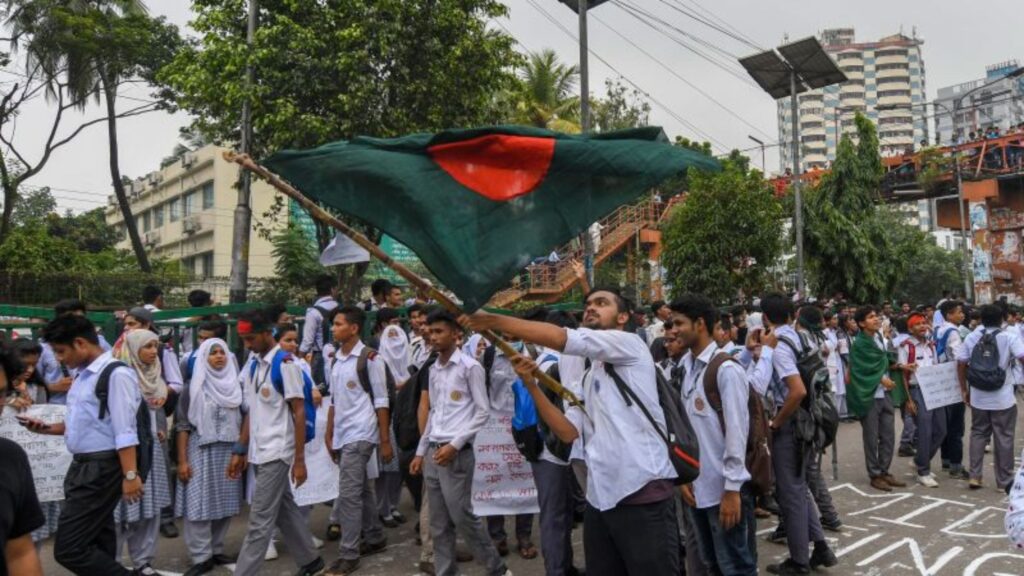
On August 5, 2024, the situation reached a boiling point when protesters stormed several key locations in Dhaka. The Awami League’s district office was set ablaze, and the residence of Sheikh Hasina was attacked. This unprecedented level of violence, including clashes that resulted in numerous casualties, signaled a critical juncture in Bangladesh’s political history.
Sheikh Hasina Resignation: The Immediate Aftermath
In the wake of escalating violence, Sheikh Hasina resigned and sought refuge in India. She arrived at the Hindon Air Base near New Delhi aboard a C-130 Hercules military transport aircraft. The move marked a significant shift in the crisis, raising questions about the future political trajectory of Bangladesh and the role of international actors in the unfolding drama.
Bangladesh is grappling with a turbulent political climate following Prime Minister Sheikh Hasina’s resignation amid intensifying protests. On August 5, 2024, in Dhaka, people celebrated Hasina’s resignation by waving Bangladeshi flags.
The Immediate Aftermath
- Political Response: Leaders of the Opposition in both Houses of Parliament, Mallikarjun Kharge (Rajya Sabha) and Rahul Gandhi (Lok Sabha), participated in an all-party meeting convened by the central government on Tuesday. This meeting aimed to address the situation in Bangladesh. External Affairs Minister S. Jaishankar led the briefing on current developments.
- Sheikh Hasina’s Resignation: Sheikh Hasina resigned on Monday amid rising protests. She traveled to Hindon Air Base near New Delhi on a C-130 Hercules military transport aircraft.
- Violence and Arson: The Bangladeshi newspaper Prothom Alo reported that agitators set fire to the Awami League’s Dhaka district office around 4 p.m. on Monday. They also torched the Awami League president Sheikh Hasina’s office at 3/A Dhanmondi, Dhaka. Protesters celebrated Hasina’s resignation and chanted slogans.
- Protest Origins: The unrest, initially driven by students demanding the abolition of a government job quota system, expanded into a broader rebellion against Hasina and her ruling Awami League party. Clashes in Dhaka on Sunday resulted in at least 95 deaths, including 14 police officers, and left hundreds more injured, according to Prothom Alo.
- Statements from Sajeeb Wazed Joy: Sajeeb Wazed Joy stated that the Army did not pressure his mother into resigning. He explained that Hasina chose to step down to avoid using force against the mob advancing towards Dhaka.
Sheikh Hasina Resignation: Bangladesh Faces Political Turmoil
- US Visa Revocation: Reports indicate that the United States has revoked Sheikh Hasina’s visa. Opposition figures in Bangladesh confirmed the revocation.
- Military Reshuffle: The Bangladesh Army has reshuffled several top-level positions, including relieving Major General Ziaul Ahsan from service, according to Dhaka Tribune.
- Presidential Meeting: Bangladesh President Mohammed Shahabuddin met with key coordinators of the student movement to discuss the current situation and the formation of an interim government.
- Muhammad Yunus’s Offer: Nobel laureate Muhammad Yunus expressed his willingness to lead an interim government in Bangladesh following Hasina’s resignation. Yunus acknowledged the protesters’ trust and emphasized the need for free elections.
- BSF Actions: The Border Security Force (BSF) Director General (Acting) Daljit Singh Chawdhary reviewed the security situation at the Petrapole border in North 24 Parganas district and issued a “high alert” across the India-Bangladesh border.
- Meetings in India: Indian officials, including Amit Shah, S. Jaishankar, and Ajit Doval, held discussions about the situation in Bangladesh.
- Indira Gandhi Cultural Centre Attack: Protests in Dhaka led to looting and arson at the Indira Gandhi Cultural Centre on August 5.
- EU Concerns: European Union diplomats expressed serious concern over attacks on minority groups in Bangladesh and called for restraint.
- Air India Operations: Air India announced the resumption of its Delhi-Dhaka flights on August 6, 2024, with a one-time waiver on rescheduling due to the ongoing situation.
- Gradual Return to Normalcy: Dhaka is slowly returning to normalcy, with visuals of traffic movement in the Azimpur area.
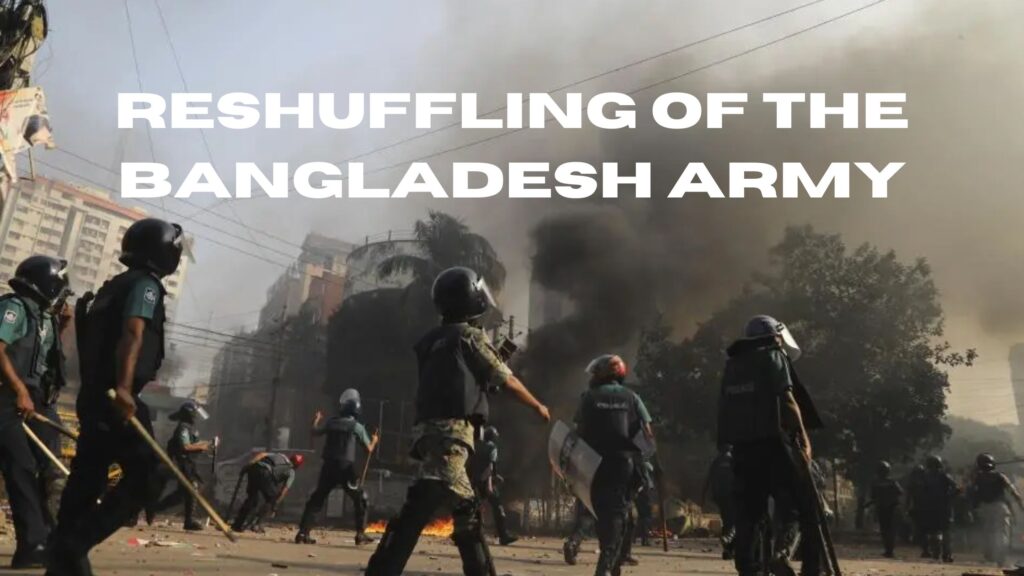
International response Bangladesh
- Medical Transfers: Critical patients from Bangladesh are being transferred to India for treatment at the Petrapole border.
- Vishva Hindu Parishad’s Appeal: The Vishva Hindu Parishad urged the Indian government to ensure the safety of minorities in Bangladesh, citing concerns about possible infiltration attempts.
- Student Leaders’ Demands: Student leaders are pressing for the dissolution of parliament and have set a deadline for this action. They have warned of stricter measures if their demands are not met.
- Jaishankar’s Statement: External Affairs Minister S. Jaishankar assured that India is in regular contact with authorities in Dhaka and is monitoring the safety of Indian nationals in Bangladesh.
- Khaleda Zia’s Release: Former Prime Minister Khaleda Zia has been released from house arrest, according to BNP sources.
- Parliament Dissolution: Bangladesh President Mohammed Shahabuddin has dissolved parliament, meeting one of the protesters’ key demands.
- Indian Nationals in Bangladesh: S. Jaishankar reported that approximately 19,000 Indian nationals, including 9,000 students, were in Bangladesh. Most students had returned to India by July.
- Bihar Alert: Bihar has issued an alert in districts near Bangladesh due to the ongoing unrest.
- Hasina’s Stay in India: Reports suggest that Sheikh Hasina may extend her stay in India, though there are no current plans for her to move to a third country.
- Taslima Nasreen’s Comments: Exiled author Taslima Nasreen criticized Sheikh Hasina’s resignation, highlighting the irony given her own past experiences with Islamist extremists.
Domestic Reactions
The Sheikh Hasina resignation was met with mixed reactions within Bangladesh. While some viewed it as a necessary step towards addressing the systemic issues that had fueled the protests, others were concerned about the potential for further instability. The burning of the Awami League’s offices and the ongoing violence underscored the severity of the situation.
Muhammad Yunus
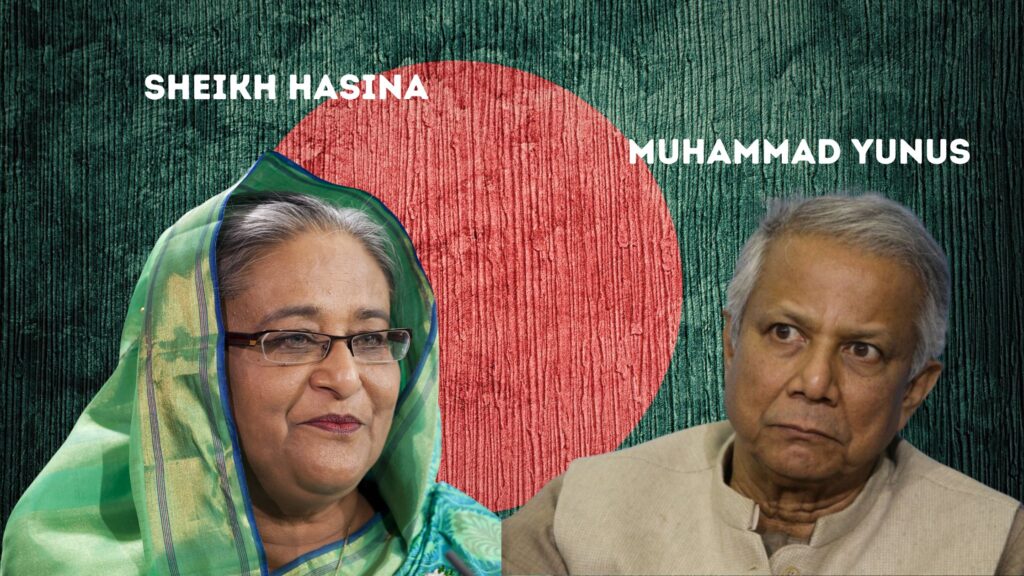
Yunus’s Potential Role in the Interim Government
Nobel laureate Muhammad Yunus emerged as a key figure in the aftermath of Hasina’s resignation. Notably, known for his pioneering work in microfinance and social entrepreneurship, Yunus expressed his willingness to lead an interim government if necessary. In particular, his readiness to step into this role highlighted a potential shift towards a more inclusive and reform-oriented leadership. Furthermore, Yunus’s involvement could signal a new direction for Bangladesh, with a greater focus on democratic processes and, consequently, addressing the root causes of the unrest.
Public and Political Support for Yunus
Yunus’s potential appointment as the head of an interim government garnered support from various quarters. Protesters, who had initially driven the movement against Hasina’s administration, saw Yunus as a symbol of change and hope. His call for free elections and democratic reforms resonated with many who were disillusioned with the previous administration’s policies.
International Response and Diplomacy
United States: Visa Revocation and Diplomatic Measures
The international community’s response to Hasina’s resignation was swift. Reports indicated that the United States revoked Sheikh Hasina’s visa in light of the political turmoil. This move underscored the US’s stance on the situation and its commitment to upholding democratic principles. The revocation also highlighted the growing concerns about the potential for instability in the region.
India: Diplomatic and Security Measures
India, sharing a long border with Bangladesh, played a crucial role in managing the fallout from the political crisis. External Affairs Minister S. Jaishankar, along with other Indian officials, engaged in high-level discussions to address the implications for both countries. India issued a high alert along its border and made arrangements to ensure the safety of Indian nationals in Bangladesh. The situation prompted a reassessment of India’s foreign policy and security strategy in light of the unfolding events.
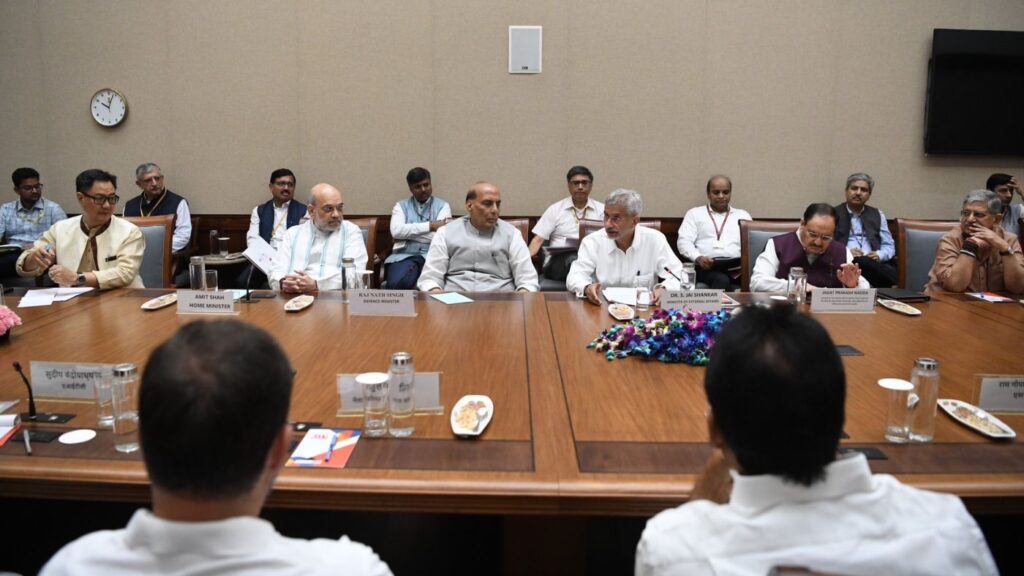
European Union: Concerns Over Minority Safety
The European Union expressed deep concern over reports of attacks on minority groups in Bangladesh. In response, EU diplomats urgently urged all parties to exercise restraint and prioritize the safety of religious and ethnic minorities. Moreover, the international community’s focus on human rights and the protection of vulnerable groups underscored the broader implications of the political unrest in Bangladesh. As a result, this heightened attention from global actors emphasizes the need for a comprehensive approach to addressing the crisis and ensuring the well-being of all affected communities.
The Impact on Bangladesh’s Political Landscape
Reshuffling of the Bangladesh Army
In response to the crisis, the Bangladesh Army undertook a significant reshuffling of its top-level positions. For instance, Major General Ziaul Ahsan, among others, was relieved from service. This restructuring was intended to stabilize the military’s role amid the ongoing situation. Additionally, it sought to address the concerns raised by both the public and political leaders. Consequently, the changes aimed to restore confidence in the military’s ability to manage the crisis effectively and demonstrate a commitment to resolving the unrest.
Dissolution of Parliament and Political Uncertainty
Bangladesh President Mohammed Shahabuddin’s decision to dissolve parliament was a pivotal moment in the crisis. This move, which was driven by the demands of protesting students and other stakeholders, marked a significant shift in the country’s political framework. Consequently, the dissolution of parliament raised critical questions about the future governance structure. Moreover, it highlighted the uncertainty surrounding the path towards establishing a new democratic process. As a result, the decision underscored the urgency for a clear plan to navigate the transition and address the concerns of all parties involved.
The Humanitarian Aspect: Displacement and Aid
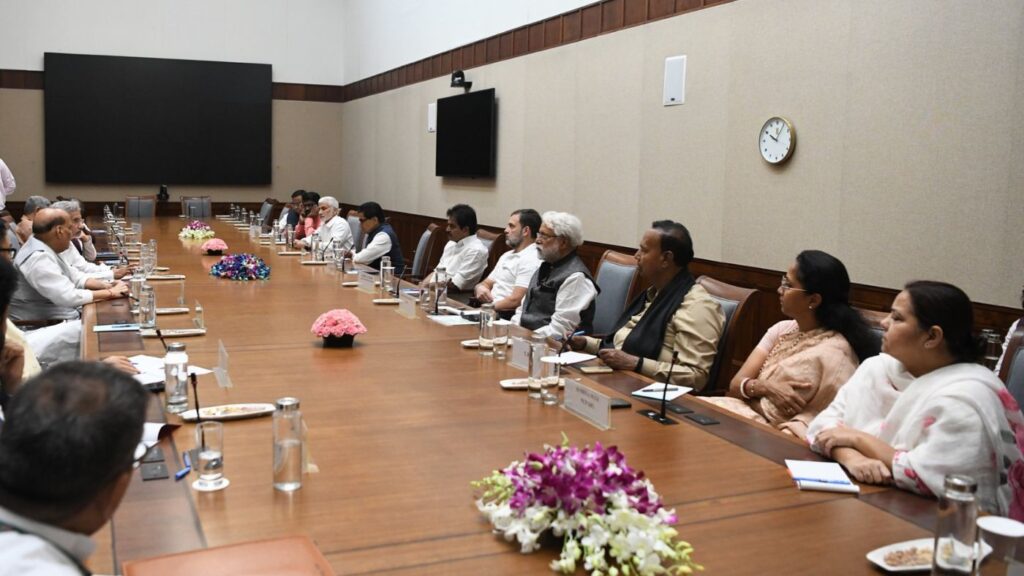
Transfer of Critical Patients to India
Amidst the chaos, reports emerged of critical patients from Bangladesh being transferred to India for medical treatment. This humanitarian aspect of the crisis, therefore, underscored the profound impact of the political turmoil on everyday lives. Furthermore, it highlighted the pressing need for cross-border cooperation in addressing urgent medical needs. Consequently, the situation emphasized not only the immediate challenges faced by individuals but also the broader implications for regional collaboration in times of crisis.
Return of Bangladeshi Nationals
Several Bangladeshi nationals, who had been in India for various reasons, began returning to their country through the Jalpaiguri border. Consequently, the gradual return of these individuals reflected a sense of improving conditions in Bangladesh. This development, in turn, suggested a cautious optimism about the situation stabilizing. Moreover, it illustrated a shift towards a more hopeful outlook, signaling potential progress in the ongoing crisis.
Insights from the Crisis
Democratic Processes and Governance
The unfolding events in Bangladesh serve as a stark reminder of the importance of robust democratic processes and effective governance. The crisis highlighted the need for transparent and inclusive decision-making to address public grievances and prevent similar upheavals in the future.
Regional and Global Implications
The political instability in Bangladesh has far-reaching implications for the region and beyond. The crisis underscores the interconnected nature of global politics and the impact of domestic issues on international relations. The responses from neighboring countries and global powers reflect the broader concerns about regional stability and security.
Sheikh Hasina resignation and the situation in Bangladesh
- Bangladesh Nationals Returning: Several Bangladesh nationals who were previously in India are now returning through the Jalpaiguri border in West Bengal. Md Saibul Islam noted that conditions in Bangladesh have improved, prompting his return.
- Congress Reactions:
- Rajeev Shukla emphasized the need for India to reassess its strategy to protect its interests and ensure the safety of Indian businesses and minorities in Bangladesh.
- Kiran Kumar Chamala remarked that the situation in Bangladesh serves as a lesson for democratic nations, highlighting the importance of careful decision-making.
- Rahul Gandhi’s Concerns: Rahul Gandhi raised concerns about India’s future foreign policy and the status of minorities in Bangladesh, questioning potential foreign involvement in the crisis.
- Iran’s Statement: Iran’s Ambassador to India, Dr. Iraj Elahi, expressed concern over the unfolding situation in Bangladesh.
- Parliamentary Discussions:
- External Affairs Minister S. Jaishankar will address the Parliament about the situation in Bangladesh.
- RJD MP Manoj Jha expressed confidence in the government’s handling of the crisis and emphasized the need for a comprehensive understanding of the situation.
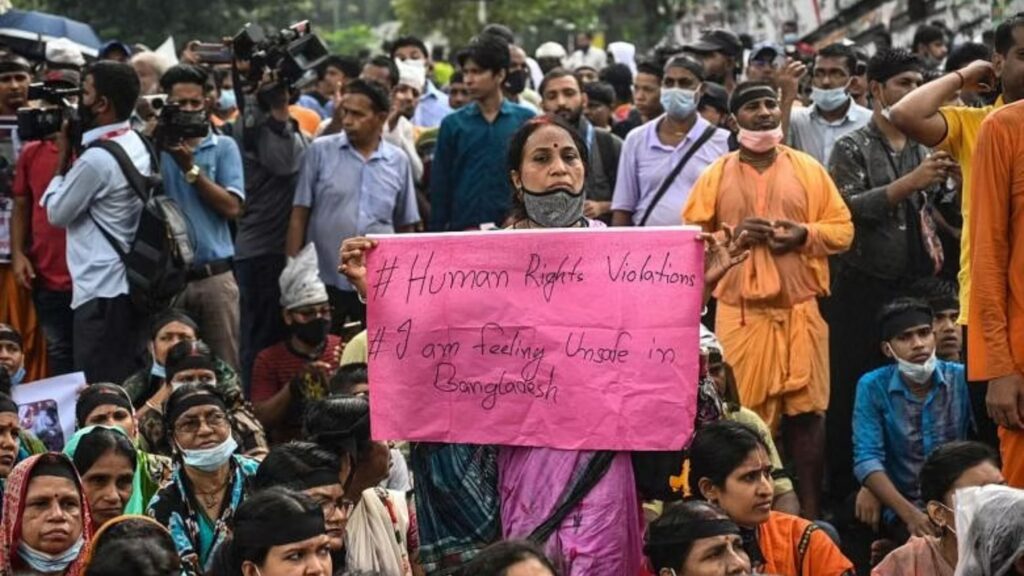
Bangladesh political crisis
- Border Security: BSF DG Daljit Singh Chaudhary has arrived at the Petrapole border, and additional police forces are deployed due to the recent violence in Bangladesh.
- NCP-SCP MP’s Statement: NCP-SCP MP Fauzia Khan criticized the situation in Bangladesh, calling for parliamentary discussions and government action regarding the safety of minorities.
- Movement of People: People are arriving in India from Bangladesh through the Petrapole-Benapole border for work, with increased security in place.
- Sheikh Hasina’s Departure: Sheikh Hasina was not aboard the C-130J aircraft that took off from Hindon airbase; the aircraft was carrying military personnel.
- Protests and Interim Government: Protesters in Bangladesh are advocating for Nobel laureate Muhammad Yunus to lead an interim government. The military chief and figurehead president plan to form an interim government and hold fresh elections.
- Garment Factories Closed: Garment factories in Bangladesh are closed following Hasina’s resignation, with decisions on reopening to be announced later.
- All-Party Meeting: The Indian government has convened an all-party meeting to discuss the situation in Bangladesh and its implications for India.
- Adjournment Motions: Congress MPs Rajeev Shukla and Manish Tewari have both submitted Adjournment Motions to discuss the Bangladesh situation in the Rajya Sabha and Lok Sabha.
- Bangladeshi Newspaper Reports: Reports indicate attacks on Hindus in Bangladesh.
Conclusion:
As Bangladesh navigates through this period of uncertainty, the focus will shift towards rebuilding and stabilizing the political landscape. The roles of key figures like Muhammad Yunus and the responses from the international community will play a crucial role in shaping the country’s future. The events of recent days offer valuable lessons for democratic nations and underscore the importance of addressing underlying issues to prevent future crises.




